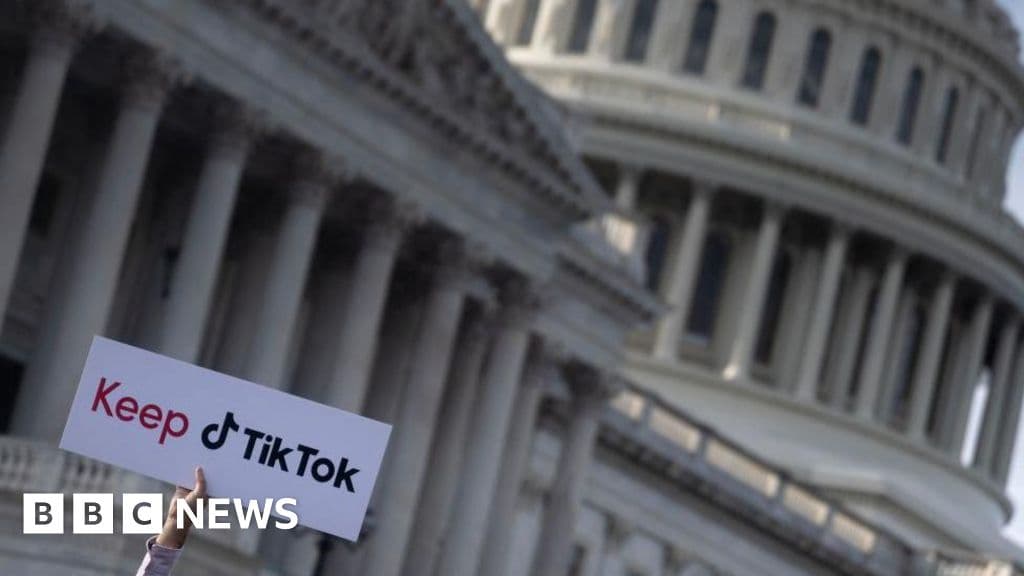Image source, Getty Images
- Author, Natalie Sherman
- Role, Business journalist, New York
-
TikTok has filed a lawsuit aimed at blocking a US law that would ban the video app in the country unless it is sold by its Chinese parent company.
In the filing, the social media company called the act an “extraordinary intrusion into the free speech rights” of the company and its 170 million U.S. users.
He said the United States had only put forward “speculative concerns” to justify the measure and asked the court to stop it.
That followed years of debate in Washington, which argued that Chinese ownership of TikTok increased the risk that data on U.S. users would fall into the hands of the Chinese government or be used for propaganda purposes.
TikTok has maintained its independence from the government, while parent company ByteDance has said it has no plans to sell the company.
The Chinese government criticized the law as US “harassment” of a foreign company and indicated it would oppose a sale.
In a briefing with reporters Tuesday, White House press secretary Karine Jean-Pierre said the law was “not a ban. It’s a divestment.”
She referred further questions to the Justice Department, which declined to comment.
Under US law, app stores would no longer be allowed to offer TikTok in the US starting in January 2025 unless parent company ByteDance finds a buyer. President Biden could extend this deadline by 90 days if negotiations progress.
In the filing Tuesday with the D.C. Circuit Court of Appeals, TikTok said the sales requirement was “simply not possible: not commercially, not technologically, not legally.” And certainly not within the 270-day period required by law.”
He said the measure unfairly singled out TikTok, creating a “two-tiered speech regime with one set of rules for one named platform and another set of rules for everyone else.”
He noted that similar ban attempts, including by former President Donald Trump, had encountered difficulties in US courts.
The company added that the decision by many politicians, including Mr Biden, to maintain accounts on the app undermined claims that it was a security threat.
The United States has in the past restricted foreign ownership of television and radio stations, which require government licenses to access the public airwaves.
TikTok said its business was separate and the government could not dictate ownership of “privately created chat rooms.”
He said he has spent more than $2 billion trying to address U.S. concerns, creating safeguards on U.S. data.
Jacob Helberg, who heads a committee charged by Congress with monitoring the national security implications of U.S.-China trade, said TikTok’s investments were seen in Washington as a “deceptive marketing effort.”
He said the trial was “not serious” and had not “resolved the national security issue at hand.”
But Ashley Gorski, senior attorney at the American Civil Liberties Union, said TikTok’s lawsuit convincingly demonstrated the measure was an effective ban, despite White House claims to the contrary, raising freedom concerns of expression.
“The government cannot impose this type of total ban unless it is the only way to prevent extremely serious and imminent breaches of national security,” she said.
“There is no public evidence of harm that would meet the extraordinarily high bar imposed by the First Amendment.”
She said comments from lawmakers, such as U.S. Sen. Mitt Romney, who recently linked widespread support for the measure in Congress to a desire to shape America’s perception of the Israel-Gaza conflict, would make it more difficult for the U.S. to defend the law.
But MP John Moolenaar, the current head of the committee which helped draft the law, said he was confident it would be respected.
“Congress and the Executive Branch have concluded, based on publicly available and classified information, that TikTok poses a serious risk to national security and the American people,” he said.
“It is telling that TikTok would rather spend its time, money and effort fighting in court than resolving the issue by breaking with the Chinese Communist Party.”
The law targeting TikTok is among a number of measures taken by the United States against Chinese technology companies in recent years, as tensions rise between the world’s two largest economies.
On Tuesday, the Commerce Department confirmed it had revoked permits that allowed U.S. companies to export certain products to Chinese tech giant Huawei.
The United States sharply limited exports of items such as computer chips to Huawei starting in 2019, citing its ties to the Chinese military.
The measures hit the company hard, but more recently it appeared to be making a comeback.



